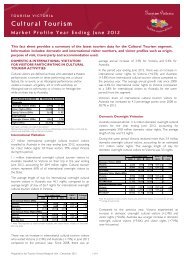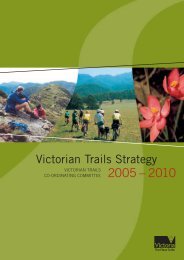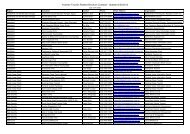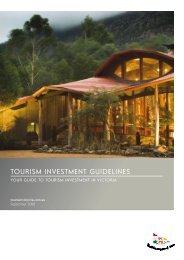Tutorial 22 Understanding Inbound Links To My Site
Tutorial 22 Understanding Inbound Links To My Site
Tutorial 22 Understanding Inbound Links To My Site
You also want an ePaper? Increase the reach of your titles
YUMPU automatically turns print PDFs into web optimized ePapers that Google loves.
<strong>To</strong>pic | Search Engine Optimisation (SEO) <br />
<strong>Tutorial</strong> <strong>22</strong> <br />
<strong>Understanding</strong> <strong>Inbound</strong> <strong>Links</strong> <strong>To</strong> <strong>My</strong> <strong>Site</strong> <br />
This tutorial will review the different types of inbound links and what influences the value they <br />
bring to your website. <br />
Reading time: 20 minutes <br />
Prerequisite: <br />
None
<strong>Understanding</strong> <strong>Inbound</strong> <strong>Links</strong> <strong>To</strong> <strong>My</strong> <strong>Site</strong> <br />
1. Why link building <br />
The previous tutorial discussed why links are important and reviewed their primary role of <br />
connecting webpages together. Search engines also use inbound links to a website to gauge its <br />
popularity and importance. Seomoz.com, a renowned search engine optimisation community <br />
says that links correspond to votes of web users. <br />
Since links are an important factor to search engines, it comes as no surprise that growing the <br />
quality and number of links to your website is critical to increase your online popularity and thus <br />
improve your search engine rankings. <br />
This discipline is referred to as “link building” or “off-‐site <br />
search engine optimisation” and is one of the most <br />
important tasks required to succeed in the online space. <br />
<strong>Links</strong> are the online version of word-‐of-‐mouth. <br />
Many search engine optimisation firms offer link-building<br />
services. However, this is something you can do <br />
yourself as the key ingredient is quality content people <br />
will want to link to. <br />
Photo credit: http://flickr.com/photos/alx/ <br />
2. Types of links <br />
There are two main categories of links: editorial links and acquired links. <br />
a) Editorial links <br />
Editorial links express the opinion of the editor. In this instance, it is the opinion person linking to <br />
you from their website. When checking who links to you, you might realise that there are a few <br />
businesses already linking to your site. These websites have decided to reference your content <br />
because they find it informative and trust that making it accessible to their users will enhance <br />
their online experience. <br />
Editorial links take time to get because they are earned as a reward for providing good, citation-worthy<br />
content. They are the links that search engines will favour and therefore have the biggest <br />
link value. <br />
b) Acquired links <br />
In this category fall all the other links (paid or unpaid). Getting these links necessitate either: <br />
• Making contact with another organisation to entice them to link to you. <br />
For instance, as the website owner you establish contact with other organisations to convince them that <br />
your content is worthy enough to be linked to. <br />
<strong>Tutorial</strong> <strong>22</strong>, Page 1 <br />
Version 7 Last updated September 2011
<strong>Understanding</strong> <strong>Inbound</strong> <strong>Links</strong> <strong>To</strong> <strong>My</strong> <strong>Site</strong> <br />
• Self creation <br />
For example, you have created links back to your website by participating in online discussion forums or by <br />
leaving comments on Blogs. <br />
• Reciprocal links, also known as link exchange <br />
“Link to me and I will link to you”. Reciprocal links are links to another website placed on your <br />
site in exchange for links back to your site from theirs. Search engines condemn this practice if <br />
both sites have nothing relevant in common. However, if you have identified a relevant website <br />
and that you both share informative and complementary content, reciprocal links are a good <br />
opportunity as both your readers and search engines will be pleased. <br />
Acquired links have less search engine value than editorial links because they bypass the <br />
feeling of trust that editorial links have. <br />
For instance, not all acquired links (especially those acquired by leaving comments on blogs) will <br />
be followed by search engines; the website where the link originates from might have used <br />
special HTML commands to prevent search engines from following the links and improving your <br />
website’s search engine placements. These HTML commands are known as “nofollow” <br />
attributes. <br />
Even though some links might not pass search engine value, they are still valuable to readers <br />
who might follow them and contact you if they find your content informative and useful. <br />
3. Stay away from malicious online directories <br />
There is a number of powerful directories which <br />
can positively influence your search engine <br />
positions. These are listed in the tutorial called <br />
“Sourcing <strong>Inbound</strong> <strong>Links</strong>”. However, there are <br />
also many dubious online directories. <br />
The purpose of directories is to group <br />
information in categories that a user can <br />
browse when searching for something specific. <br />
People have soon realised that having their <br />
website listed in a directory creates an inbound <br />
link to their site, thus possibly providing a <br />
positive “vote” for their website and improving <br />
their search engine rankings. This has given ideas to many web-‐savvy entrepreneurs and <br />
directories started to flourish. There are now millions of <br />
TIP <br />
directories on the web and it is difficult to sort the good <br />
directories from the ones whose priority is not to help humans <br />
find relevant websites but to make money by selling links that Delete all dubious emails <br />
may improve search engine rankings. <br />
asking you to purchase a link <br />
<strong>Tutorial</strong> <strong>22</strong>, Page 2 <br />
Version 7 Last updated September 2011
<strong>Understanding</strong> <strong>Inbound</strong> <strong>Links</strong> <strong>To</strong> <strong>My</strong> <strong>Site</strong> <br />
Photo credit: http://flickr.com/photos/mildlydiverting/ <br />
Google, Yahoo!, Bing and other search engines are well aware of these practices and have <br />
recently started removing malicious directories from their search engine rankings. <br />
Stay away from directories that: <br />
• Offer to increase your site’s rankings <br />
• Offer you a premium membership with even more links <br />
• Offer you the possibility to put hyperlinks in your keywords <br />
• Talk to you using web jargon confirms their intention of helping search engines and not <br />
the end user <br />
There are still thousands of genuine directories. Below is a list of safe directories: <br />
• Yahoo Directory http://dir.yahoo.com <br />
• Librarians Internet Index www.lii.org <br />
• Open Directory Project www.dmoz.org <br />
• Nature.com www.nature.com/nrg/info/info_links.HTML <br />
• About.com www.about.com <br />
a) How can you tell if a directory is dubious? <br />
• The directory’s purpose is generic (indexes anything and everything) instead of niche <br />
• It tells you straight away that purchasing a link will help your search engine rankings <br />
• You can choose what text will be used as a hyperlink to your site <br />
• Try “Googling” the name of the directory. If it doesn’t appear in search engine results <br />
then it has already been banned by Google <br />
4. Value given to a link by search engines <br />
Paragraph 2 about the different types of links highlighted that editorial links the type of links that <br />
search engines prefer. However, there are other factors that influence the value of inbound <br />
links that your website might receive. No one but the search engines themselves know in full <br />
depth the weight of each factor but the following assumptions can be made: <br />
Characteristics of the site linking to you <br />
Popularity: <br />
PageRank <br />
If a website is popular, in search engine terms, it means that it already has relevant <br />
and high quality links pointing to it. This infers that links from popular website will <br />
provide your site with a better link value than least popular sites. <br />
PageRank: Google bases the popularity of each individual webpage on a scale from <br />
non-‐existent to 10. This scale is called PageRank (PR). Even though this measure <br />
remains relevant in certain cases, you should consider it with caution as it only gets <br />
updated a few times a year. You can check the PageRank of any of your webpage on <br />
your Google toolbar or on www.checkpagerank.net <br />
<strong>Tutorial</strong> <strong>22</strong>, Page 3 <br />
Version 7 Last updated September 2011
<strong>Understanding</strong> <strong>Inbound</strong> <strong>Links</strong> <strong>To</strong> <strong>My</strong> <strong>Site</strong> <br />
Relevancy: <br />
<strong>Site</strong>s that are related to your industry or sector provide greater link value than non-related<br />
sites. <br />
For instance, if you are a hot air ballooning business, a link from a well-‐known <br />
balloon manufacturer is going to be of greater value than a link from your friend’s <br />
national lawn-‐mowing business. <br />
Trust: <br />
Trust refers to trusted domain names and extensions such as .edu.au, gov.au. <br />
Obtaining a link from a trusted domain generally positively increases your page’s <br />
placement amongst search engine results. <br />
Think outside the square: is there any way you or your business could obtain a link <br />
from an education provider or a government site? Are you involved in an alumni <br />
committee? A local council? <br />
Number of links on the <br />
page: <br />
Hyperlinks: <br />
The value of the link will be diminished if the page linking to you has many other links. <br />
This demonstrates that the link value from a directory is demised as directories, by <br />
definition, list many businesses on each page! <br />
When possible, ensure that the site linking to you uses your keywords in the hyperlink <br />
to your page. <br />
For instance, ask the balloon manufacturer to link to you in a similar manner: <br />
If you are in North Queensland, our partners doing hot air ballooning in Cairns will <br />
provide you with an unforgettable experience. <br />
Avoid this: for hot air ballooning in cairns click here <br />
Remember that the above rules also apply when you link to other sites. Help the websites you <br />
link to by adding the link within you content, and create a link using the keywords of the person <br />
you are linking to. <br />
Finally, keep in mind that it is better to have a handful of quality relevant links than tens of <br />
thousands of low-‐value, inappropriate links. Search engines focus on quality and relevancy. <br />
5. Key learning outcomes <br />
• Search engines place a high value on relevant links to your website and this will help <br />
your website rank better on search engines <br />
• It is therefore important to have a link building strategy in place to continuously grow <br />
the number of relevant and quality links pointing to your website. <br />
<strong>Tutorial</strong> <strong>22</strong>, Page 4 <br />
Version 7 Last updated September 2011
<strong>Understanding</strong> <strong>Inbound</strong> <strong>Links</strong> <strong>To</strong> <strong>My</strong> <strong>Site</strong> <br />
6. Related material <br />
a) Related tutorials <br />
• Target market 101 <br />
• Search engines 101 <br />
• Critical components of optimising a website <br />
• Keywords <br />
• Sourcing inbound links <br />
• Travel and tourism links <br />
b) Related websites <br />
• Editorial link building: www.ask-‐kalena.com/articles/editorial-‐link-‐building-‐with-‐article-marketing/<br />
<br />
• Link exchange (Google) <br />
www.google.com/support/webmasters/bin/answer.py?answer=66356&query=link+exc<br />
hange&topic=&type <br />
• Link building to watch out for: www.untanglemyweb.com/About/Blog/articleID/2/Link-‐<br />
Building-‐What-‐<strong>To</strong>urism-‐Operators-‐should-‐watch-‐out-‐for <br />
<strong>Tutorial</strong> <strong>22</strong>, Page 5 <br />
Version 7 Last updated September 2011
















